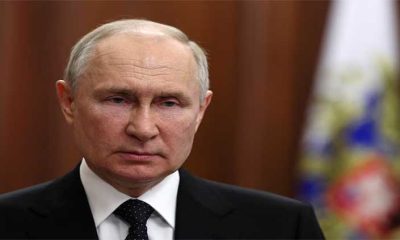Egypt said on Friday it had signed a deal with the United Arab Emirates to develop a prime stretch of its Mediterranean coast that would bring $35 billion of investments to the indebted country over the next two months.
The deal with ADQ, the smallest of Abu Dhabi’s three main sovereign investment funds, is for the development of the Ras El Hekma peninsula and could eventually attract as much as $150bn in investments, Egyptian Prime Minister Mostafa Madbouly told a press conference.
Such inflows would provide a huge boost to Egypt’s crisis-stricken economy as it faces new pressures linked to the war in Gaza and seeks an expansion of its current IMF support programme.
The country has long struggled to attract large-scale foreign investment outside the hydrocarbons sector. In the financial year that ended in June 2023, net foreign direct investment stood at $10 billion.
Egypt’s sovereign dollar bonds soared on Friday ahead of the announcement and continued their rally into the afternoon.
Longer-dated bonds enjoyed the biggest gains, with those maturing in 2031 or beyond up more than 4 cents in the dollar to trade at 65.5-73.4 cents – for most their highest level in around a year, Tradeweb data showed.
“If the financing comes through as planned, we believe this (along with an upsized IMF programme) should provide ample liquidity to cover Egypt’s financing gap over the next four years,” Farouk Soussa of Goldman Sachs said in a note.
‘NEXT GENERATION CITY’
Earlier this month, an Egyptian newspaper had reported that the United Arab Emirates had expressed an interest in buying the Ras El Hekma area on Egypt’s northern coast as a form of economic support for Cairo.
Ras El Hekma lies about 200 km (124 miles) west of Alexandria in an area of upscale tourist resorts and white sand beaches popular with wealthy Egyptians during the summer months.
ADQ said work to build the “next generation city” over 170 square kilometres – nearly a fifth of the size of Abu Dhabi city – would begin in early 2025. The city would feature investment zones, technology and light industry, amusement parks, a marina and an airport as well as tourism and residential developments.
Egypt’s government will retain a 35 per cent stake in the project.
Madbouly said the deal would bring in $15bn in the next week and $35bn over two months – though he said $11 billion of that money would be converted into Egyptian pounds from existing UAE dollar deposits in Egypt’s central bank.
ADQ did not include any timeframe for investments in its statement.
Egypt has been mired in a slow-burning economic crisis that includes a chronic shortfall of foreign currency which has led to sustained pressure on the Egyptian pound, on government spending and on local businesses.
Read more: Diversification of economy: Saudi sovereign wealth fund splashes cash in 2023
Inflation accelerated to record levels last summer, the debt burden has been rising, and the shortage of foreign currency could deepen because of lost revenues from the Suez Canal after attacks on shipping in the Red Sea by Yemen’s Houthi movement.
A $3bn financial support package from the International Monetary Fund (IMF) signed in December 2022 faltered after Egypt paused on a pledge to move to a flexible exchange rate regime and progress on state asset sales proved slow.
Talks with Egypt to boost its IMF loan programme were making excellent progress, the IMF said on Thursday. It said Egypt needed a “very comprehensive support package” to deal with economic challenges, including pressures from the war in Gaza.
‘TOO BIG TO FAIL’
Since President Abdel Fattah al-Sisi came to power, Egypt – the Arab world’s most populous country – has received tens of billions of dollars in bailouts from wealthy Gulf states that backed his toppling of the Islamist Muslim Brotherhood in 2013.
But this avenue has largely dried up in the past two years as Gulf nations have chosen to link support to free-market reforms and seek profitable investments in some of Egypt’s most prized assets.
ADQ insists its mandate is purely commercial, according to people close to the company, but is chaired by Sheikh Tahnoon bin Zayed al-Nahyan, who as well as being a prominent businessman is UAE national security adviser and is seen as a foreign policy trouble-shooter for his brother, the president.
The announcement of the Ras El Hekma deal showed that Egypt was “too big to fail”, said Viktor Szabo, portfolio manager at Abrdn in London.
“This is a good development and will help with growth for sure, but Egypt will see the benefits more over the medium term,” he said.
The economic crisis has increased pressure on Egypt’s leadership to scale back on massive infrastructure projects that have been a hallmark of Sisi’s rule, and reduce the dominance of the state and the military in the economy.
However, Sisi has continued to insist that mega-projects generate investment and jobs. In an economic survey of Egypt published on Friday the OECD said limits on new projects should be extended, tax collection improved and barriers to the private sector reduced, among other structural reforms.
Post Views: 34


 Fashion3 months ago
Fashion3 months ago
 Sports3 months ago
Sports3 months ago
 Sports3 months ago
Sports3 months ago
 Fashion2 months ago
Fashion2 months ago
 pakistan3 months ago
pakistan3 months ago
 World3 months ago
World3 months ago
 pakistan3 months ago
pakistan3 months ago
 Tech3 months ago
Tech3 months ago



















